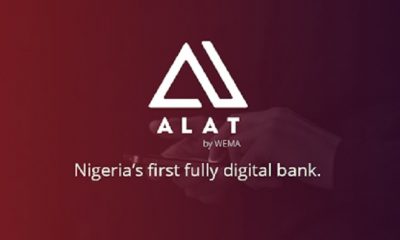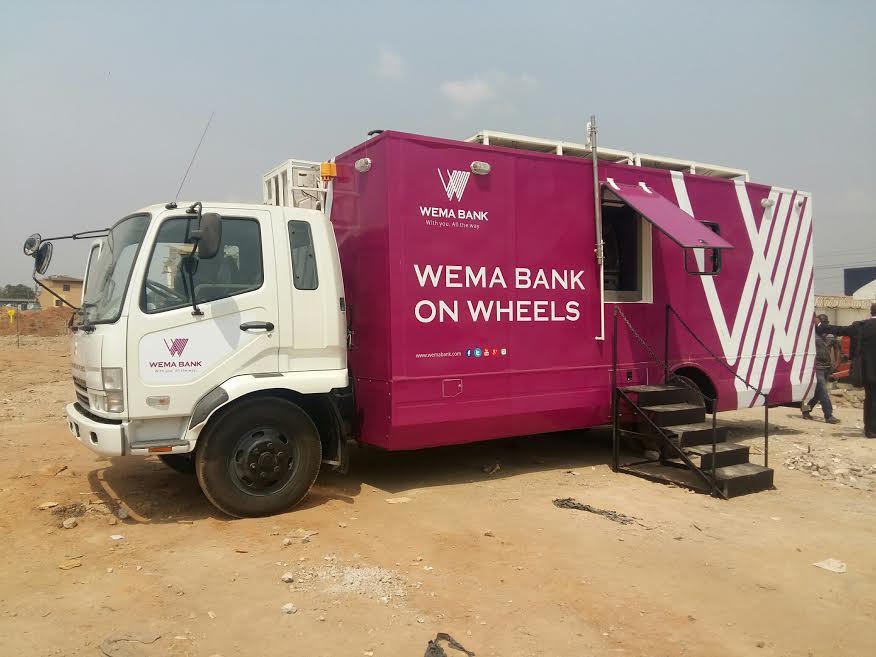Banking
Wema Bank To Raise N50b Tier-2 Capital

By Dipo Olowookere
Wema Bank Plc is raising N50 billion tier two capital through bonds to enable it deepen its market penetration and profitability, its Managing Director, Segun Oloketuyi, has said.
Speaking at a briefing at the weekend, in Lagos, the bank chief said N20 billion would be raised in the first few weeks while the remaining N30 billion would come in the near future.
“We will increase the drive of the ongoing cost containment initiatives and leverage on technology to increase efficiency across our channels and platforms. The bank will also be raising additional debt capital in the next few weeks to further give it the necessary leverage to drive growth,” he said.
Continuing, he said: “We are doing debt capital. It is a tier two capital and it is a bond. The bond will open very soon, it is a N50 billion issuance programme, but we are doing it in two tranches. The first tranche is N20 billion, and the second tranche is N30 billion. So, we are taking N20 billion first, and sometimes in the near future, and as the need arises, we will take on the balance of N30 billion.”
Mr Oloketuyi said the bank has witnessed a turnaround since the new management took over in June 2009, adding that before the coming of the new management, the lender had a negative capital position of N45 billion, with the lender virtually on its knees. He said the new management has grown the bank’s shareholders’ funds to N46 billion.
Explaining further, he said the lender previously had less than one per cent market share, and ran on obsolete technology, while non-performing loans (NPLs) stood at 89 per cent. But with the new management, the NPLs have dropped to 2.9 per cent while profitability has risen to new heights.
“So, we had to start to look at what to do with the bank and therefore, developed a containment strategy focusing on how to stabilise the bank. The periods of 2010 to 2014 was largely used to give life back to the bank. So, the first major assignment we had to do was to secure the regulatory capital. We had to recapitalise the bank, which we did,” he said.
Wema Bank boss said the lender received the Central Bank of Nigeria’s (CBN’s) final approval to convert from regional to national bank. The bank, he added, is also driving its growth with new products and technology.
For instance, it unveiled the card control platform, which gives customers absolute control of their cards both in Nigeria and abroad. The bank has received lots of testimonials based on the introduction of the product.
“The bank equally launched the Buxme platform, a social account that allows people to transfer money using their email or phone numbers, and has over 4,000 registered users as at August 15.
The lender also introduced the *955#, which enabled it to increase customer acquisition and makes banking convenient for users. The product has enabled the lender to reduce its cost of service with over 3,539 accounts opened on *945#”.
Speaking further, he said in spite of the challenges in the economy and in the industry, the lender remains optimistic about its future. “Our retail focus is beginning to yield good numbers and we are already ramping up efforts to ensure that we deliver on the promises to our stakeholders. In addition, the journey to lead the digital landscape is critical as it will propel us to the front of the industry,” he said.
He said the bank has also received final approval from the CBN’s to convert its banking license from regional authorisation to national authorisation. “The bank now operates as a full-fledged commercial bank in all geo-political zones and the Federal Capital Territory (FCT). The bank is fully prepared to scale up its operations to cover locations in the north and eastern parts of the country. We expect to re-open five branches in the next three months in Kaduna, Lokoja, Minna, Aba and Enugu,” he said.
Banking
CIBN to Back ACAMB on Professional Development, Industry Advocacy

By Modupe Gbadeyanka
The Chartered Institute of Bankers of Nigeria (CIBN) has promised to support the ambitious plans of the Association of Corporate and Marketing Professionals in Banks (ACAMB).
At a meeting between the leaderships of the two organisations on Tuesday, the president of CIBN, Professor Pius Deji Olanrewaju, said it was impressed with the capability development and the undergraduate mentorship schemes of ACAMB under its leader, Mr Jide Sipe.
The CIBN chief commended the forward-thinking vision of the group, saying it had raised standards across Nigeria’s banking sector.
“ACAMB’s support has given CIBN and the banking sector brand equity,” he said, praising the association’s record in reputation management. recalling ACAMB’s role in addressing crises within the sector, describing the partnership as strategic and beneficial.
He further pledged support for ACAMB’s 30th anniversary in September 2026, its AGM, and other programmes, including fundraising initiatives.
“I want to assure you that everything you have presented today has been clearly noted and will be acted upon.
“We are fully committed to working closely with you so as to translate these discussions and vision into measurable progress. Our shared goal is to strengthen the sector, protect its reputation, and enhance its public image in a meaningful and lasting way.
“This meeting discussed various initiatives and reforms crucial for the future of our industry, including the need for continuous training and adaptation to new programs,” Mr Olanrewaju stated.
Speaking at the meeting, the president of ACAMB described the visit as a crucial first step in his tenure, aimed at contributing significantly to giving flight to his vision and that of ACAMB.
“When we assumed office, one of the first things we agreed on was the need to visit key stakeholders.
“However, before reaching out more broadly, we felt it was important to begin with our primary constituency and core stakeholders. We want them to understand the direction we are taking and to support the work we are doing, so that ACAMB can achieve greater success than it has in the past.
“We couldn’t have properly started our tenure without this very important meeting with the CIBN,” Mr Sipe stated
He introduced the newly constituted ACAMB Exco, which includes the 2nd Vice President, Morolake Phillip-Ladipo; General Secretary, Olugbenga Owootomo; Assistant General Secretary, Ademola Adeshola; Publicity Secretary, Abiodun Coker; and Executive Secretary, Fadekemi Ajakaiye.
Banking
All Set for Second HerFidelity Apprenticeship Programme

By Modupe Gbadeyanka
Registration for the second HerFidelity Apprenticeship Programme (HAP 2.0) organised by Fidelity Bank Plc has commenced.
The Divisional Head of Product Development at Fidelity Bank, Mr Osita Ede, informed newsmen that the initiative was designed to empower women with sustainable entrepreneurship skills.
The lender created the flagship women-empowerment initiative to equip women with practical, income‑generating skills and structured pathways to entrepreneurship.
“HerFidelity Apprenticeship Programme 2.0 reflects our commitment to continuous improvement. Having evaluated feedback from the first edition, we have returned with stronger partnerships and deeper mentorship programmes to ensure that women acquire not just skills, but sustainable economic opportunities,” he said.
“At the heart of the programme is guided, real‑world learning. Participants will undergo intensive apprenticeship training under reputable institutions and industry experts across select fields such as hair styling, shoe making, auto mechatronics, and interior decoration,” Mr Ede added.
He noted that HerFidelity Apprenticeship Programme 2.0 goes beyond skills acquisition by offering participants a wide range of business advisory services. These include business and financial literacy training, mentorship support throughout the apprenticeship journey, access to Fidelity Bank’s women‑focused and SME financial solutions, as well as guidance on business formalisation and growth strategies.
Further emphasising the bank’s vision, Mr Ede said, “By integrating structured mentorship with entrepreneurial development, Fidelity Bank is positioning women not just as trainees, but as future employers, innovators, and economic contributors within their communities. This aligns with our mandate to help individuals grow, businesses thrive, and economies prosper.”
Banking
The Alternative Bank Opens New Branch in Ondo

By Modupe Gbadeyanka
A new branch of The Alternative Bank (AltBank) has been opened in Ondo State as part of the expansion drive of the financial institution.
A statement from the company disclosed that the new branch would support export-oriented agribusinesses through Letters of Credit and commodity-backed trade finance, ensuring that local producers can scale beyond state borders.
For SMEs, the bank is introducing robust payment rails, asset financing for equipment and inventory, and supply chain-backed facilities that strengthen working capital without trapping businesses in interest-based debt cycles.
The Governor of Ondo State, Mr Lucky Aiyedatiwa, represented by his Chief of
Staff, Mr Olusegun Omojuwa, at the commissioning of the branch, underscored the importance of financial institutions in economic development.
“The pivotal role of financial institutions to economic growth and development of any economy cannot be overemphasised. It provides access to capital, supporting small and medium-scale enterprises and encouraging savings.
“Therefore, I have no doubt in my mind that the presence of The Alternative Bank in Ondo State will deepen financial services, create employment opportunities and stimulate economic activities across various sectors,” he said.
In her remarks, the Executive Director for Commercial and Institutional Banking (Lagos and South West) at The Alternative Bank, Mrs Korede Demola-Adeniyi, commended the state government’s leadership and outlined the lender’s long-term vision for Ondo State.
“As Ondo State steps into its next fifty years, and into the future anchored on the sustainable development championed during the recent anniversary celebrations, The Alternative Bank is here to be the financial engine for that vision. We didn’t come to Akure to hang banners. We came to fund work, farms, shops, and factories.”
With Ondo State’s economy anchored largely on agriculture, particularly cocoa production, poultry farming, and other cash crops, alongside a growing SME and trade ecosystem, AltBank is deploying sector-specific financing solutions tailored to these strengths.
For cocoa aggregators, processors and poultry operators, the bank will provide production financing, facility expansion support, machinery lease structures, and structured trade facilities under its joint venture and cost-plus financing models, with transaction cycles of up to 180 days for commodity trades and longer-term structured asset financing for equipment and infrastructure.
The organisation is a notable national non-interest bank with a physical network now surpassing 170 locations, deploying capital to solve real-world challenges through initiatives such as the Mata Zalla project, which saw to the training of hundreds of women as electric tricycle drivers and mechanics.
-

 Feature/OPED6 years ago
Feature/OPED6 years agoDavos was Different this year
-
Travel/Tourism10 years ago
Lagos Seals Western Lodge Hotel In Ikorodu
-

 Showbiz3 years ago
Showbiz3 years agoEstranged Lover Releases Videos of Empress Njamah Bathing
-

 Banking8 years ago
Banking8 years agoSort Codes of GTBank Branches in Nigeria
-

 Economy3 years ago
Economy3 years agoSubsidy Removal: CNG at N130 Per Litre Cheaper Than Petrol—IPMAN
-

 Banking3 years ago
Banking3 years agoSort Codes of UBA Branches in Nigeria
-

 Banking3 years ago
Banking3 years agoFirst Bank Announces Planned Downtime
-

 Sports3 years ago
Sports3 years agoHighest Paid Nigerian Footballer – How Much Do Nigerian Footballers Earn




















